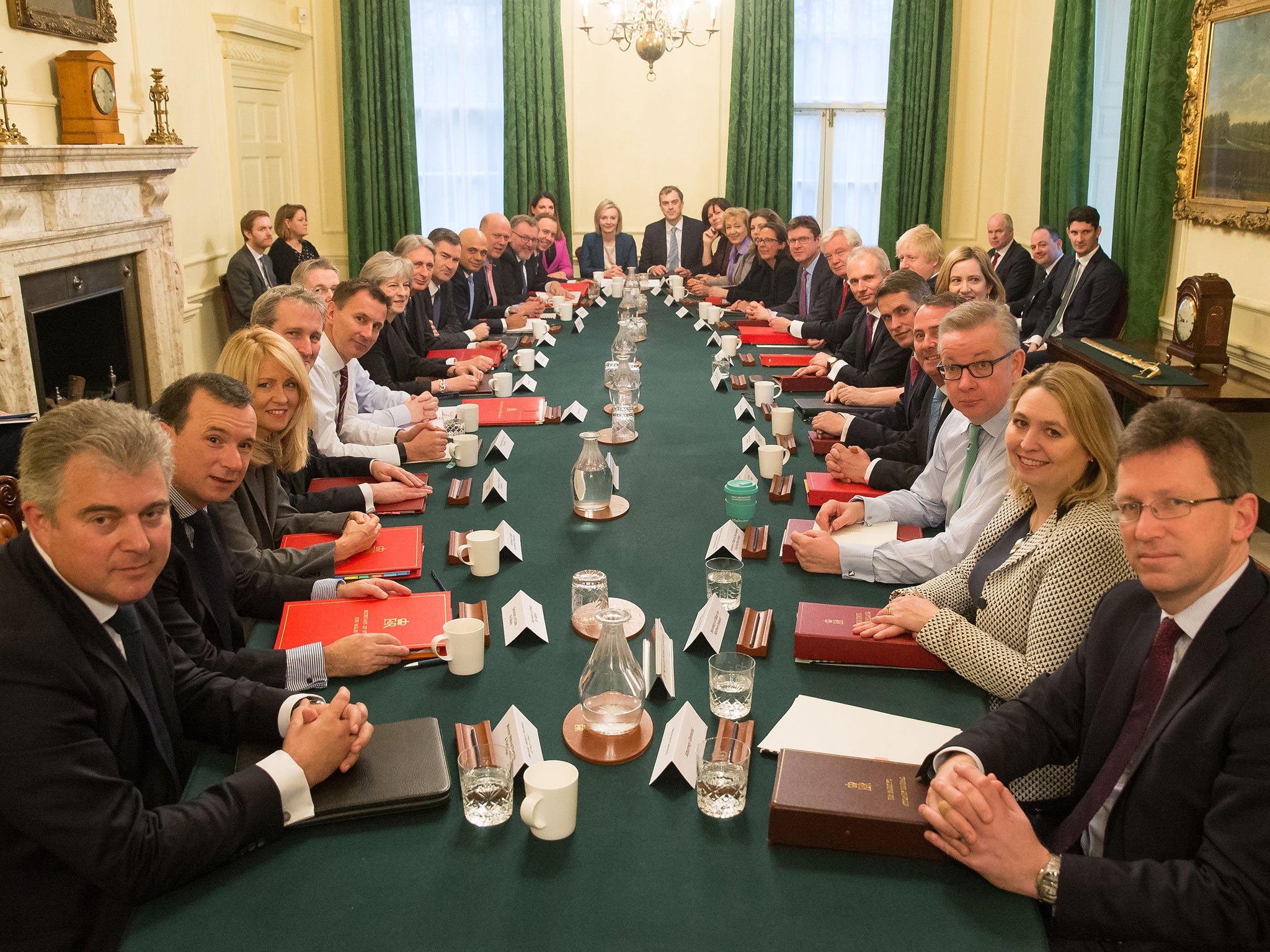Theresa May's cabinet members now five times more likely to be privately-educated than British public
PM has taken 'a step in the wrong direction', critics say

Privately-educated politicians make up more of Theresa May’s new Cabinet than her last one and ministers are now five times more likely to have gone to a fee-paying school than the general population.
More than a third (34 per cent) of ministers received a private education, compared with 30 per cent in the previous team, according to analysis by the Sutton Trust educational charity.
It found that just four in 10 of the new Cabinet were educated in comprehensive state schools. That figure has dropped by 3 per cent since the Prime minister announced her first Cabinet in July 2016, the analysis shows.
Despite an increase in ethnic minority and female ministers, this progress cannot distract from the “hard reality” that places in the Cabinet remain “largely the preserve of the privately educated”, said Dr Lee Elliot Major, the Sutton Trust's chief executive.
Critics however, claimed that the rise in Cabinet ministers with a private education meant that the Government could not “accurately reflect the experiences of ethnic minorities in Britain”.
The analysis shows that nearly a quarter (24 per cent) of the current Cabinet attended selective state schools – significantly higher than David Cameron’s 2015 Cabinet, when the figure stood at 7 per cent.
Nearly half (48 per cent) of the new Cabinet went to either Oxford or Cambridge University, an increase of 4 per cent from Ms May's first Cabinet.
However, 50 per cent of ministers in Mr Cameron's 2015 Cabinet had attended those institutions.
Comparing the current proportion of privately educated Cabinet members to previous cabinets over time, 62 per cent of the coalition 2010 cabinet received a private education. In earlier cabinets under Conservative Prime Ministers the figure was higher, at 71 per cent under John Major in 1992 and 91 per cent under Margaret Thatcher in 1979).
Privately educated ministers in Tony Blair and Gordon Brown's Cabinet's meanwhile, made up of 32 per cent of their cabinets, while 25 per cent of former Labour Prime Minister Clement Attlee’s first Cabinet in 1945 attended public school.
Dr Lee Elliot Major, chief executive of the Sutton Trust, said the increased number of privately educated Cabinet ministers was “disappointing”, saying it indicates that people from low and middle class backgrounds are still largely required to pay for their education in order to “get to the top”.
He said: “Theresa May made great progress in the composition of her first cabinet, so it is disappointing that yesterday’s reshuffle means that progress has reversed a little. The Prime Minister’s Cabinet has to reflect the society that they represent and this is a step in the wrong direction.
“Anyone should be able to become a minister, regardless of social background. Today’s figures remind us how important it is to make sure that young people from low and middle income backgrounds also have access to the best schools and the best universities that will enable them to get to the top of so many of our professions which remain largely the preserve of the privately educated.”
Dr Wanda Wyporska, executive director of The Equality Trust, meanwhile told The Independent it was “clear that despite the Prime Minister wanting a Britain that works for everyone, we remain a Britain ruled by an elite minority”.
She added: “While a great deal of attention has gone to the increase in women and ethnic minorities being promoted, we must not be distracted from the hard reality, that ... there's one minority that is hoarding positions in the cabinet, the judiciary, and the media and that's the privately-educated.
“In light of the apparent collapse of the Social Mobility Commission, this ought to be a wake-up call for the Government. We call upon the Government to appoint individuals to the Commission with experience of a variety of social backgrounds.
“This matters because it is yet another indicator of the huge inequality that is rife in the UK, and as we know, in countries with higher levels of inequality, we also see higher levels of mental ill health, physical health and less social mobility.“
Omar Khan, director of the Runnymede Trust, said that while it was "pleasing" to see a significant rise in the number of ethnic minority ministers, he was concerned that the Cabinet was still dominated by privately educated people.
“This not only doesn’t reflect the nature of Britain in terms of class, but also doesn’t accurately reflect the experiences of ethnic minorities in Britain either, who as Ms May’s recent racial disparity audit showed, still experiences significant inequalities," he told The Independent.
“The Conservative Party does deserve credit for promoting ethnic minorities. As recently as 2010 they only ever had four ethnic minority MPs in their history, and now there are nine ethnic minority ministers. But there’s still a long way to go and part of it is this point around private schools and race.
“More ethnic minorities are poor and working class, so if the route of an ethnic minority candidate getting a seat and then getting a job around the table is also through private or selective schools, then there’s a long way to go before they are represented."
Subscribe to Independent Premium to bookmark this article
Want to bookmark your favourite articles and stories to read or reference later? Start your Independent Premium subscription today.

Join our commenting forum
Join thought-provoking conversations, follow other Independent readers and see their replies